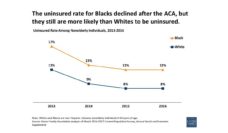A recent study found that aggressive marketing by insurance companies of short-term health plans may cause confusion among individuals shopping for health insurance online. Short-term plans don’t have to meet now standard requirements to cover pre-existing conditions or essential health benefits, and could lead to more Americans not having adequate protection if health crises arise.
Short-term health plans were originally designed to cover individuals with gaps in coverage–between jobs, for example–and were limited to 90 days under the Obama Administration and the Affordable Care Act (ACA). New rules issued in August 2018 extended the limit of short-term plans to 364 days and allow them to be renewed for up to 36 months. In effect, these “short-term” plans could serve as long-term alternatives but without the ACA’s comprehensive coverage. Short-term plans are enticing because they often have relatively low costs due at least in part to the limited benefits they provide.
The study was conducted in two phases last October and November, before and after open enrollment, the time when individuals can enroll in or change health insurance plans through the online Marketplace established under the ACA. Researchers looked for health insurance options online using search terms such as “cheap health insurance,” “short-term health insurance,” “Obamacare plans,” and “ACA enroll.” Before open enrollment, more than 99% of search results led to sites selling plans that may not cover pre-existing conditions or include the essential health benefits. During open enrollment, the advertising improved, but not by much: 81% of search results led to websites selling plans that may not meet ACA requirements.
Researchers found many of the websites prompted potential customers to enter contact information and some personal data, such as income or smoking status that could influence the cost of insurance. These sites then redirected customers to sites where they could buy insurance products or connected them to insurance brokers, who also sometimes called directly.
When prompted to provide information online, researchers posed as healthy 29-year-olds expecting to earn $29,000 in 2019, making them potentially eligible for premium subsidies that could reduce the cost of comprehensive coverage.
Short-term health plans were originally designed to cover individuals with gaps in coverage– between jobs, for example – and were limited to 90 days under the Obama Administration and the Affordable Care Act (ACA).
In some cases, researchers answered phone calls from brokers who used aggressive phone tactics, urging consumers to purchase coverage on the spot with little information about the plan. When asked to provide written materials about the plan, brokers either refused or hung up.
The Centers for Medicare and Medicaid Services (CMS) estimate that 2 million people will take-up short-term plans by 2022. These consumers should be on the lookout for skimpy plans and aggressive sales tactics, neither of which will serve them well if they become ill.
If you are considering short-term plans as an alternative to comprehensive, but cost-prohibitive coverage, it’s important to understand what your plan covers. This fact-sheet from the Kaiser Family Foundation lists features of short-term plans that could differ from ACA-compliant coverage, but because short-term plans take many forms it’s best to confirm benefits with your insurer directly.
Understanding how short-term plans are marketed is important for both consumers and state regulators. Several states (California, Hawaii, Massachusetts, New Jersey, Rhode Island, Vermont, Washington, Oregon, and New York) have banned the sale of short-term plans because, among other limitations, they do not cover pre-existing conditions. Some state regulators say that purchasing a short-term plan is better than nothing, while others are concerned consumers won’t know what they’re getting into. Needless to say, individuals shopping for health insurance online should proceed with caution.
Image: admakz/iStock














